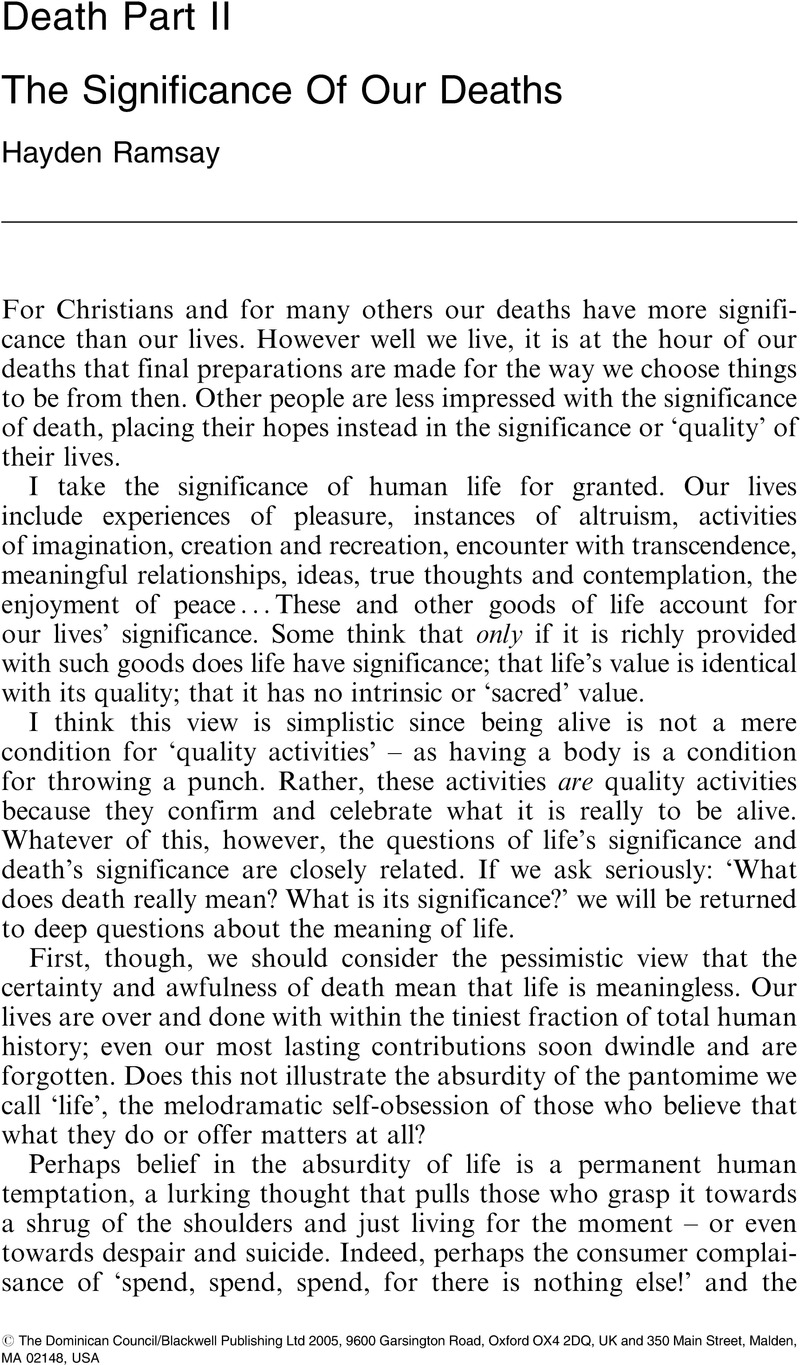No CrossRef data available.
Article contents
Death Part II: The Significance Of Our Deaths
Published online by Cambridge University Press: 01 January 2024
Abstract

- Type
- Original Articles
- Information
- Copyright
- Copyright © The Dominican Council/Blackwell Publishing Ltd 2005, 9600 Garsington Road, Oxford OX4 2DQ, UK and 350 Main Street, Malden, MA 02148, USA
References
1 See Guillemine de Lacoste ‘Simone de Beauvoir: from the creation of “New Man” to obsession with death’, Philosophy Today, Winter 1987, pp. 306–35.
2 Dastur, Françoise Death: an essay on finitude, trans. Llewelyn, John (London: Athlone, 1996), p. 84Google Scholar.
3 Ratzinger, Joseph Commentary on The Documents of Vatican II, vol. 5, ed Vorgrimler, H (New York: Herder & Herder, 1969), p. 140Google Scholar
4 Dastur, p. 67.
5 McCabe, Herbert Law, Love and Language(London: Sheed and Ward, 1968), p. 76Google Scholar.
6 I do not think those who have had heart attacks but been ‘revived’ were truly dead.
7 Alphonso Lingis ‘We Mortals’, Philosophy Today, 1991, pp. 119–26.
8 Nagel, Thomas The View From Nowhere(New York: Oxford University Press, 1986), p. 231Google Scholar.
9 Catechism of the Catholic Church(London: Geoffrey Chapman, 1994), 1006, 1008Google Scholar.
10 Oguejiofer, J. ‘The Question of Death’ in The Philosophical Significance of Immortality in Thomas Aquinas(Lanham: University Press of America, 2001)Google Scholar asks: how can we die if the rational soul is our life‐source and is self‐subsistent and imperishable? He answers: because body is material and so changeable ‘and, as a result, can lose the dispositions on account of which it is fitted to receive life from the soul’, p. 141. There is genuine debate as to whether before the Fall death would or would not have been natural. Thomas thinks pre‐Fallen man was supernaturally gifted immortality contingent upon his obedience (Summa Theologiae 1 – 2, 85, 6; 1, 95,1; 1, 97, 1). For Augustine too, the pre‐Fallen would not have died, but rather been ‘assumed’ after their time of trial (City of God 14, 10).
11 Pieper, Josef Death and Immortality, trans. R. and Winston, C. (London: Burns and Oates, 1969), p. 72Google Scholar.
12 Hamilton, Christopher Living Philosophy: reflections on life, meaning & morality(Edinburgh: Edinburgh University Press, 2001)Google Scholar, Ch 11.
13 Nussbaum, Martha ‘Mortal Immortals: Lucretius on Death and the Voice of Nature’, Philosophy and Phenomenological Research, 50, 1989, pp. 303–51CrossRefGoogle Scholar.
14 Leon Kass ‘L’Chaim and Its Limits: why not immortality?’, First Things, May 2001,
15 Nussbaum, p. 343.
16 And, on the other hand, unreasonable fighting against death can have bad consequences in terms of ‘work patterns, parenthood, the social security system, and species renewal’, as Kass, op cit argues. For Kass, benefits of mortality and finitude include interest and engagement in the world around us, seriousness and aspiration in life, the beauty and love of perishable things, and striving for virtue and moral excellence, including self‐sacrifice.




